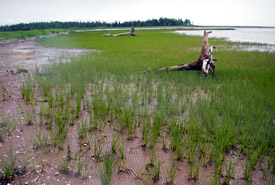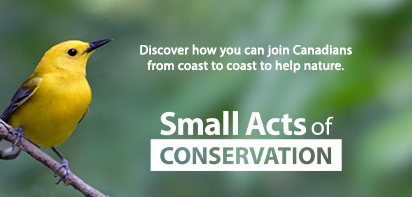Percival River

Percival River, Prince Edward Island (Photo by NCC)
Percival River
Together with our conservation partners, the total protected area in the Percival River area is over 850 hectares of coastal salt marsh, freshwater wetlands and predominantly black spruce forest.
The Percival River forest is mainly made up of spruce, but it also features aspen, birch, ash and eastern white cedar, which are characteristic of the Maritimes' mixed Wabanaki (Acadian) forest. Eastern white cedar is not common on PEI, and is usually found in swampy areas or on thin, limestone-based soils. A healthy cedar tree provides an array of benefits to wildlife: its seeds are eaten by many species of small birds and mammals, and its understory provides year-round protection for wildlife.
A variety of unusual fungi, lichens, ferns and wildflowers flourish in the forest, including several rare species of lichen. The Percival River area boasts the widest diversity of lichen in PEI. Many species of lichen are sensitive to air pollution, and their presence and variety indicates a healthy environment.
Along with its important forest habitat, the Percival River feeds into Egmont Bay and includes ecologically rich wetland habitats that are critical to the life cycle of many populations of migratory waterfowl, shorebirds and seabirds. The largest unbroken tract of salt marsh in PEI is located along the Percival River.
Located approximately 40 kilometres west of Summerside, the Percival River area is one of the wilder corners of PEI that local people cherish and that few others have explored. As the area is low-lying and was always considered too wet for agriculture, much of its forests remain undisturbed.
The Nature Conservancy of Canada (NCC) is pleased to be stewarding and conserving land in the Percival River area, with the help of people like you and our conservation partners. There is still more work to do, and you can help.
Learn more
To learn more about the NCC’s work on Prince Edward Island and how you can contribute, please connect with Meghan Coyle, development officer, NCC, or explore the East Coast Nature Fund.
Our partners and donors
NCC wishes to acknowledge and thank the project donors, including:
- Government of Canada, Natural Heritage Conservation Program
- Province of PEI
- TD Forests
- Island Nature Trust
- The U.S. Fish and Wildlife Service
- PEI Wildlife Conservation Fund
- and many local donors




